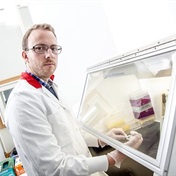US scientists have sequenced the entire genetic code of four gravely ill newborns and identified genetic diseases in three of them in two days, quick enough to help doctors make treatment decisions.
Doctors behind the preliminary study say it demonstrates a practical use for whole genome sequencing, in which researchers analyse all 3.2 billion chemical "bases" or "letters" that make up the human genetic code.
"It is now feasible to decode an entire genome and provide interim results back to the physician in two days," said Dr Stephen Kingsmore, director of the Center for Pediatric Genomic Medicine at Children's Mercy medical centre in Kansas City, Missouri, whose study was published in the journal Science Translational Medicine.
How the study was done
The study tested two software programs developed at Children's Mercy that were used in conjunction with a high-speed gene sequencer from Illumina called HiSeq 2500, which can sequence an entire genome in about 25 hours.
The company helped pay for the study and company researchers took part in it.
Next-generation gene sequencing machines have driven down the cost of whole genome sequencing, but making practical use of the data has been more challenging, largely because of the time it takes to analyse all of the data.
As many as a third of babies admitted to a neonatal intensive care unit in the United States have some form of genetic disease. Treatments are currently available for more than 500 diseases, but identifying them quickly has been a problem.
Typically, genetic testing on newborns using conventional methods takes four to six weeks, long enough that the infant has either died or been sent home.
"Up until now, they have really had to practise medicine blindfolded," Kingsmore said in a telephone briefing with reporters.
How the program works
Dr Neil Miller, director of informatics at Children's Mercy, said the software programs help doctors identify which genes to test, and analyse the data quickly.
One of these programs, called SSAGA, allows doctors to order this test based on the child's symptoms, without having to know in advance which genes to test for.
The software only maps genes associated with the child's symptoms. SSAGA does this for nearly 600 diseases, but the team is expanding this to include all 3 500 known disease genes, Miller told the briefing.
The team developed a second software program called Runes that helps determine which of the suspected genes was most likely to be the cause of the child's illness.
What the study found
In the study, the team tested the system on four seriously ill babies whose conditions were suspected of having a genetic cause. Only one of the infants is still alive, a boy born with a rare heart defect that the team discovered is also shared by the child's six-year-old brother. The infant underwent heart surgery.
The testing also was able to diagnose a rare form of epilepsy in a baby girl, and identify the likely cause of a rare and lethal skin condition in a baby boy, which arose from a new genetic mutation that was not passed down from either parent. The team was unable to find out what caused another boy's heart defect.
"We basically struck out completely, for now anyway," said Dr Carol Saunders, clinical lab director at the hospital who helped interpreted the study results.
Even though the study did not provide cures for the babies, she said, it could give parents more information about the cause of their child's illness and allow them to make decisions about what kinds of treatments they wanted to pursue.
The test is projected to cost $13,500, but the team believes that may be worth it given the high cost of care in a neonatal intensive care unit, which runs roughly $8,000 per night.
The next move is to broaden the test to include 100 or more babies to determine the benefits, costs and potential problems linked with the testing.
Because the Illumina machine was not available in the United States, the team had to discount the time it took to ship the blood samples to Britain, where the actual sequencing was done.
But Kingsmore said the hospital expects to receive its own HiSeq 2500 machine next month. Eventually, the hospital hopes to have its testing validated, so the researchers can do genetic testing on newborns in hospitals across the United States.
(Reuters, October 2012)
Read more:
Intelligence is in the genes




 Publications
Publications
 Partners
Partners










